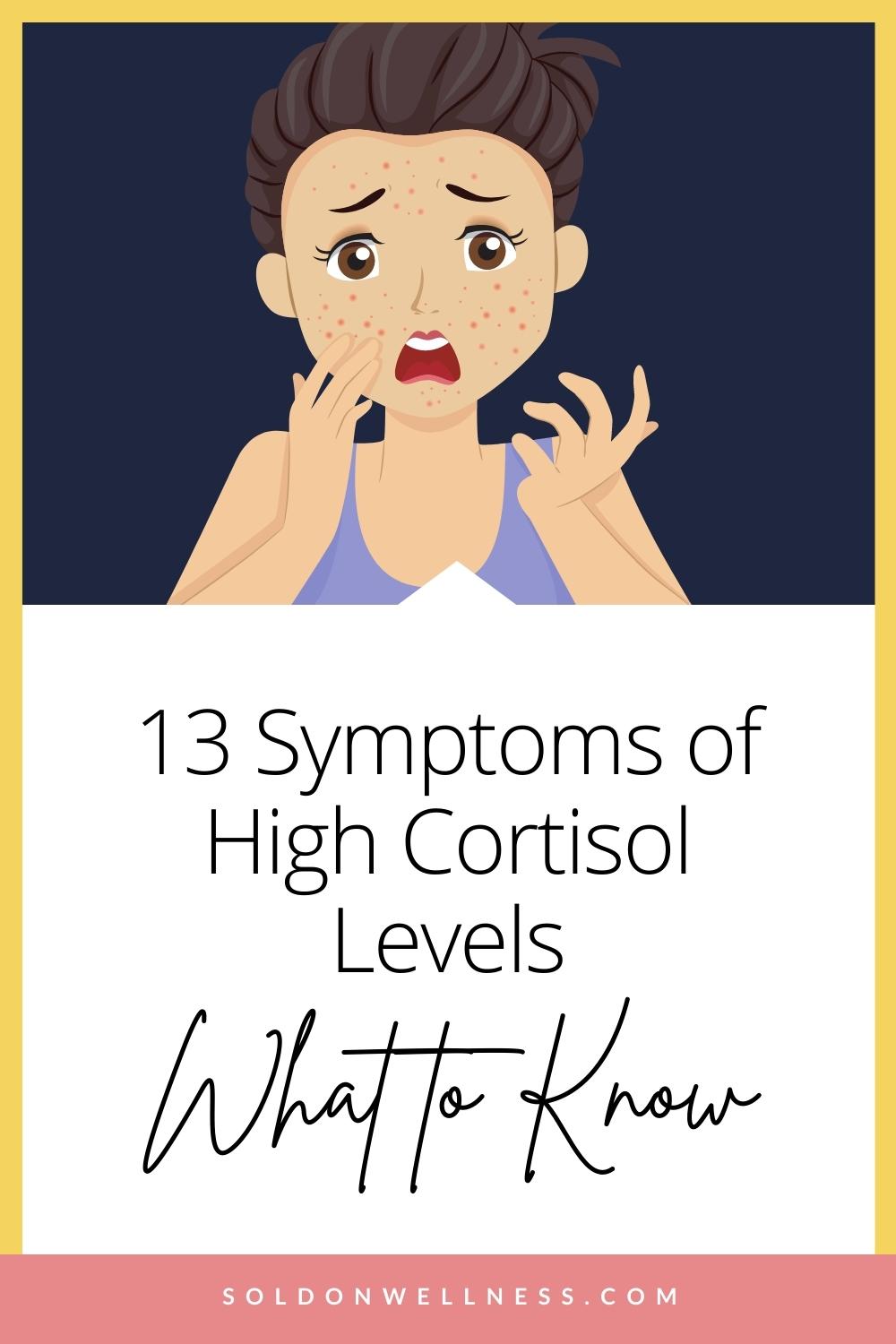Symptoms of high cortisol levels are important to know because they can affect a person's mental and physical health for the long term.
Cortisol is a steroid hormone that regulates the metabolism of carbohydrates, proteins, and fats.
The adrenal gland secretes it in response to stress, and it tells the body to release sugar into the bloodstream for quick energy.
But cortisol levels can get too high- which can lead to serious health problems.
In this blog post, we will discuss what symptoms of high cortisol levels you should be looking out for so that you know when it's time to take action!
13 Signs you are experiencing cortisol overload

Cortisol is a hormone that regulates many biological processes and has been associated with weight gain.
The adrenal glands secrete it in response to stress, which means it can cause weight gain even when you're not eating more or exercising less than usual.
This section will talk about some of the triggers for cortisol releases, like sleep deprivation and signs of cortisol overload.
1. You feel tired all the time

Cortisol can cause you to feel exhausted even when there's still plenty of time left in the day.
In one study, people who were given cortisol showed a drop in blood pressure and heart rate, leading to feelings of fatigue and low energy levels.
With constantly elevated cortisol levels, the body produces less oxytocin, the hormone that helps you feel calm and relaxed when in touch with loved ones and relieves pain after childbirth.
With lowered oxytocin levels, it's harder to fight stress, and you'll probably find yourself feeling overwhelmed with seemingly nothing at all ("fight or flight" response).
2. You are always hungry, but never full

This is a symptom of high cortisol levels, also called Cushing's Syndrome.
Cushing syndrome is a condition that is caused by prolonged exposure to high levels of cortisol.
Cushing syndrome can cause weight gain, swollen hands and feet (from fluid retention), increased urination, fatigue, thinning scalp hair (alopecia) and depression.
You may be eating more than usual, but your body can't recognise its own hunger signals and interprets the feeling of fullness as a sign to eat more.
Sugar and carbs can make you want to eat more, which will cause your body to release even more cortisol.
A high-sugar diet also releases a hormone called leptin that tells the brain when we have eaten enough food.
When there is too much sugar in your system, it becomes harder for yourself or others around you to know when you're full.
This is why sugar-heavy or high glycemic index foods can lead to weight gain and metabolism slow down, which in turn will cause even more cortisol release.
This cycle of overweightness can be difficult to break because the symptoms that come with being overweight also contribute to releasing cortisol.
3. Your mood swings from happy to sad without warning

High cortisol levels in the body can interfere with your brain's natural ability to regulate emotions.
The part of the brain most affected by high cortisol is called the hippocampus, which regulates mood and memory function.
The excessive stress hormone can cause a decrease in dopamine production, leading to emotional instability or depression.
4. You find it difficult to concentrate or focus

Higher cortisol levels can cause a decrease in serotonin, the hormone that helps regulate sleep cycles and moods.
When there is too much cortisol in your system, you will have problems with memory retention or "brain fog."
Lowered serotonin leads to feelings of irritability, anxiety, depression, trouble sleeping, concentration difficulties and weight gain around the midsection.
If you or someone close to you is experiencing these symptoms, it's time for a check-up.
A doctor can determine the exact level of cortisol in your body and will be able to give you advice on how to lower levels by changing certain diet habits or taking medication (if necessary).
5. You have trouble sleeping through the night and wake up feeling exhausted every day

A high cortisol level will lead to a decrease in REM sleep (the deepest stage of sleep) and an increase in the time it takes your body to reach that state.
This leads to insomnia or waking up feeling exhausted, which can cause you to eat more sugar for energy because you're not getting enough rest at night.
High cortisol levels can also affect the way you respond to stress, which is why those with excess levels need to get as much sleep and relaxation time as possible.
6. Your skin is either too oily or too dry, and you break out often

Excess cortisol can lead to a decrease in collagen production, which is needed for healthy skin.
High levels of stress will also cause your body to produce more oil on your face as an attempt at protecting itself from bacterial attacks ("fight or flight" response).
Higher cortisol levels have been shown to contribute to acne by reducing how much oil the skin produces.
This will lead to either high oily or dry skin and may, in turn, cause more breakouts due to increased acne-causing bacteria on your face.
8. Your immune system is compromised
Cortisol is a natural stress hormone that reacts to the presence of physical or emotional pain and stimulates an immune response.
It increases blood flow, which brings more nutrients and white cells to your wound to fight infection.
The higher cortisol levels also suppress the body's inflammatory response (think fever), so you can heal faster.
The problem is that the higher cortisol levels can suppress your immune system and make you more prone to illness including, but not limited to: colds, influenza, strep throat or even pneumonia.
When stress becomes chronic over a long time, the body will adapt to protect itself from future damage and may lose its ability to respond to inflammation.
9. Your muscles are tight and tense all the time

High cortisol levels can cause your muscles to tense up and stay in a state of "fight or flight" even when there is no immediate danger.
The high stress level will also decrease the amount of blood flowing into these tight muscles, making them difficult to relax.
This leads to more pain over time because you're not getting proper blood flow to those muscles, and they are not properly "stretched."
Exercise will help release some of the tension while also improving your mood.
People with high cortisol levels need to take care of their bodies through proper diet, sleep patterns, and exercise because they can negatively affect our overall health.
10. You can't sleep well at night because of nightmares or insomnia
When the body is under too much stress and not getting enough rest, it will produce more cortisol to elevate your mood.
The problems with this are that high levels of cortisol lead to a decreased immune system response (see #8) and difficulty sleeping at night.
Insomnia or nightmares can make you feel like there's no rest for the weary and will make you long to sleep even more.
If this sounds like something happening in your life, high cortisol levels might be a contributing factor.
To help prevent these problems from worsening, try lowering your stress level through healthy living habits so you can get enough rest each day.
11. Your sex drive has decreased significantly
High cortisol levels can decrease your libido significantly due to the hormone shutting down testosterone production, which is needed for a successful sex drive.
12. You've gained weight without any change in diet

Weight gain can be caused by many factors, not just overeating and lack of exercise.
Cortisol has been linked to some weight-related health issues such as abdominal obesity, loss of muscle mass, and metabolic syndrome.
Cortisol is also thought to increase appetite and decrease feelings of fullness, which can lead to weight gain.
Cortisol levels rise in response to stress—physical or mental—and the body stores this energy as fat for later use when it might be needed.
This means that periods of unrest such as a stressful project at work or an illness may lead to weight gain.
If you've been experiencing any of these symptoms, it's important to see your doctor and rule out other conditions that can be causing them before assuming it is just the stress in your life.
Some health issues cannot be solved on one's own, so if you are concerned about high cortisol levels or have had a
13. Disturbed menstrual cycle, including irregular periods or heavy menstruation
High cortisol levels can contribute to reproductive disorders, such as irregular periods or heavy menstruation.
Hormones work together in the female body, and high cortisol levels can disrupt hormone balance by decreasing estrogen production while increasing testosterone production.
This may lead to irregular menstrual cycles shorter than normal, with heavier bleeding during the period (aka menorrhagia).
Both men and women must take care of their bodies by practising stress management techniques or getting professional medical help if needed.

Triggers for high cortisol release
Cortisol levels can be triggered because of stress, which is a common reason for weight gain.
Many things can make you feel stressed out in life, from work to family issues or just general anxiety.
One of the unfortunate feelings we often experience on stressful days is hunger and overeating because our body thinks it needs more food when really what it needs is time away from everything.
In addition to this, here are some other triggers for cortisol release:
1. Work deadline:

That sure sounds very familiar right? When you are faced with a deadline at work, there is no doubt that you might feel stressed out about it.
This can lead to the release of cortisol in your body and make weight gain more likely.
Now I’m not referring to a one-off deadline, but if you are constantly working under pressure, this will be a problem.
2. Sleep deprivation
Sleep deprivation (both chronic and acute) can trigger the release of cortisol, which can lead to weight gain.
Lack of sleep raises the risk of consuming more calories while also slowing metabolism and lowering energy levels, all factors that increase the potential for weight gain.
A single night with less than five hours of sleep may result in a 16 per cent higher intake on average at an upcoming meal than those who slept for eight hours.
A study found that, for every hour of sleep participants lost over a period of two weeks, they would eat an additional 183 calories in the following day.
When you’re not getting enough quality sleep, and your body is running on less fuel due to lack of sleep or poor diet choices while awake, it can lead to cortisol levels spiking.
Cortisol is a stress hormone that can be beneficial in small doses, but too much of it can lead to weight gain and other health issues like sleep deprivation and depression.
3. Physical exhaustion
The chronic physical exhaustion that can come with a demanding job causes the body to produce more cortisol than usual, affecting appetite.
When you find yourself physically exhausted, your body will start to crave anything that’s high-energy or sugar-rich.
4. Peer pressure

Peer pressure has a connection with weight gain.
In some cases, it may be a subconscious behaviour where someone is trying to please their peers, which can lead to excessive consumption of junk food that tastes good but has little substance in terms of nutrition.
As female entrepreneurs, we need to be our biggest cheerleaders and support each other.
We have enough people in the world telling us what we can’t do or who are discouraging us from taking risks, but it is up to us to show ourselves that we deserve better than that.
We should try not to fall into the trap of comparing ourselves to others and staying true to what we need to thrive.
5. Binge eating
You may not have physical hunger, but you’re feeling an emotional need to eat something sweet after a stressful event; it could be binge-eating.
You might also find yourself indulging in high caloric or fatty foods even if your body is full because of the pleasurable feeling.
Binge eating causes our body’s responsivity to insulin, a hormone that regulates the body’s sugar level and turns carbohydrates into energy, to be suppressed.
This insulin suppression can lead you to gain weight rapidly because your cells are not being fed with enough glucose.
6. Insufficient exercise/exertion
Insufficient exercise or exertion can lead to cortisol overproduction.
This unfortunate effect results from the body's natural response to fight or flight, which means that excess energy in our bloodstream can be converted into fat during periods of high stress and anxiety.
Exercise has been shown to combat this as it increases metabolism and causes muscles cells to become more sensitive to insulin - two things you want to keep in mind is that exercise can help you lose weight and you can start from the comfort of your home.
7. A sedentary lifestyle
Sitting for extended periods of time has been shown to cause a surge in cortisol levels, which is the hormone that regulates our blood glucose level and turns carbohydrates into energy.
It's unfortunate but understandable why sitting all day might lead to weight gain because your cells are not fed with blood glucose from food.
Symptoms of high cortisol levels can be alleviated by:
- exercise,
- reducing caffeine intake,
- practising deep breathing exercises
- mindfulness-based stress reduction, and
- healthy eating habits such as avoiding refined sugars, eating protein-rich foods at each meal to help stabilize blood sugar levels.

Benefits of lowering high cortisol levels
- feeling more balanced emotionally,
- a decrease in depression or anxiety,
- better memory retention and concentration,
- improved quality of life and weight loss.
It's important for entrepreneurs, especially female ones, to take care of themselves to focus on their businesses.
One way is by eating healthily and not doing too much stress-inducing activity like bingeing on food or skipping exercise.
Lowering your cortisol level could help increase your energy, improve sleep quality, and lower inflammation.
You might also like:
How to love yourself without being selfish
How to Relieve Stress and Anxiety | 5 Day Gratitude Challenge
Finally...
Chronic stress can be harmful to your health, and it can lead to higher levels of cortisol.
Cortisol is a hormone that regulates blood glucose, so if you're experiencing high stress for an extended period of time, this could mean your body's responsivity to insulin gets suppressed, which can cause weight gain.
Getting a handle on the symptoms of high cortisol levels can help you better understand your body and what it needs to thrive.
This article has given some insight into how this hormone is created, its effects on the body, and when it becomes harmful.
The takeaway here is that our bodies react to stress in many ways, which means we need to be mindful about recognising excess cortisol so we don't suffer long-term health consequences from it!
I hope this was useful and interesting for you; I would love it if you took a moment at the end of the reading to leave me comments or questions below. Let's chat 🙂









